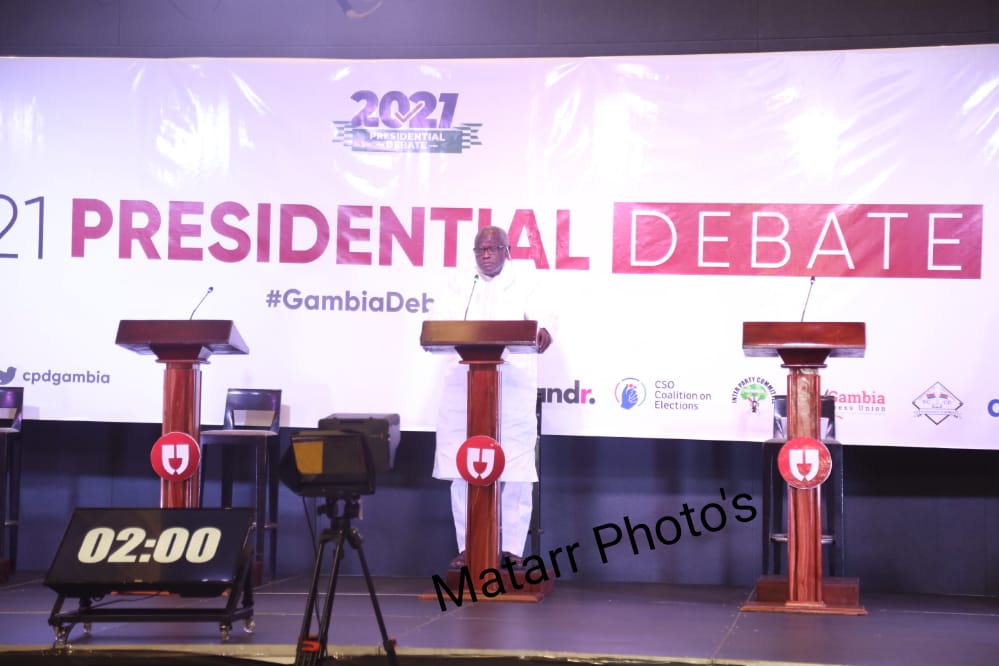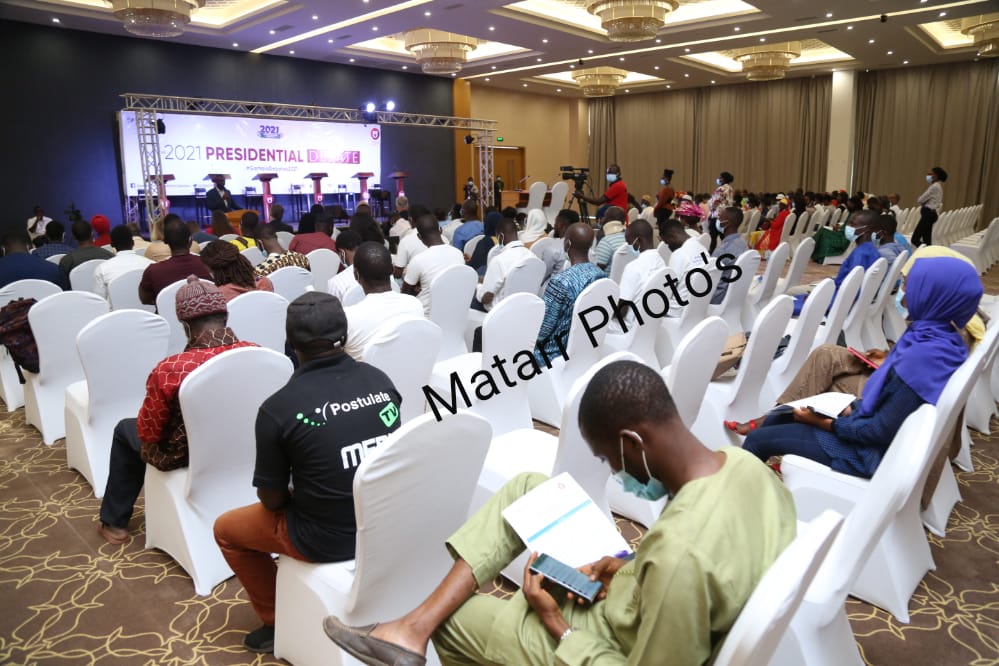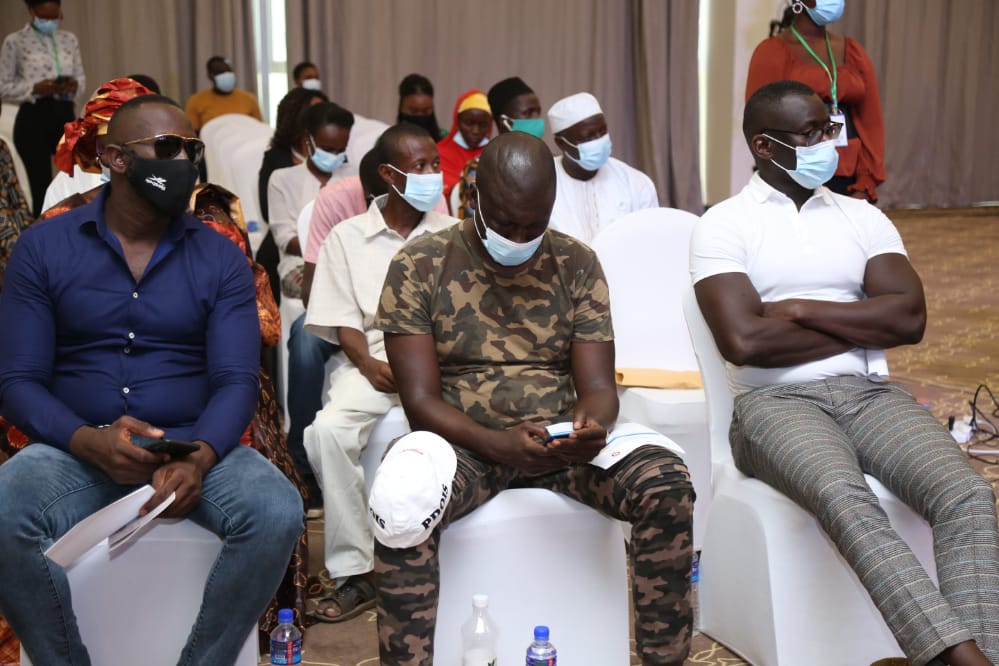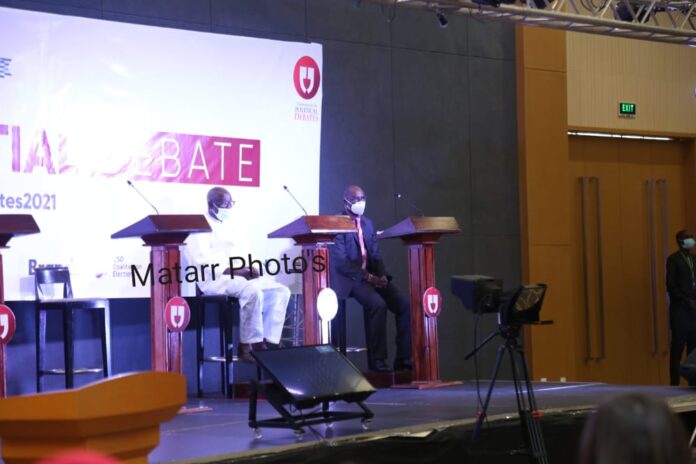By Nelson Manneh
In what was the maiden edition in the history of The Gambia, two presidential candidates faced off in a public debate ahead of the December 4 presidential poll held at the Sir Dawda Kairaba Jawara Conference Centre, Bijilo on 20 November, 2021.
Out of six presidential candidates the Independent Electoral Commission (IEC) gave the green light to contest in the forthcoming election, only two braced up to the call for a public debate, which is unprecedented.

Halifa Sallah of the People’s Organization for Independence and Socialism (PDOIS) party and independent candidate Essa Mbye Faal were the two candidates many Gambians on social media said ‘deemed it necessary to participate’ in the debate.
The debate which many Gambians described as “the battle of ideas and/or policies”, was organized by the Commission on Political Debates (CPD) and moderated by two prominent Gambian journalists, Saikou Jammeh the former secretary general of Gambia Press Union (GPU) and Fatounatta Ceesay of the national broadcaster, GRTS.
The two debaters deliberated on five thematic areas, namely, agriculture, the economy, education, infrastructure, and health.
On Agriculture
Sallah said the country has 550,000 hectares of arable land but only 57% is being cultivated. He said agriculture is the key foundation of our survival. He said the country has the capacity to produce oil, onions, etc. saying people consume D29 million on the importation of potatoes and about D6.2 billion on the importation of edible oil.
“Rice can be cultivated and what we are importing is between two billion and four billion annually when we can produce the rice in the country because every hectare can produce about four turns of rice; meaning all you need is about fifty thousand hectors to be able to produce all the rice we are consuming and therefore prevent the importation of rice and create a foreign exchange,” he said.

He said a PDOIS-led government would create cooperative banks that will be providing equipment, seeds, and fertilizers to farmers, who after the farming season, will pay exactly what they have owed without any interest.
The veteran politician also said they are going to help gardeners produce tomatoes and all that they need to be able to pay to the cooperative banks without any interest. He added that after a year, they will start to move to self-sufficiency.
“There is no excuse for climate change, there are various rice varieties that can be used. All we need is to adjust ourselves to the realities of climate change and within two years we should be able to feed ourselves. Creating a cooperative bank is a means of eradicating poverty,” he said.
Mr. Faal on the other hand said any country that cannot feed itself is doomed, saying the Gambia is blessed with massive resources. Faal said he has visited rice fields across the country and all of them a lying fallow, citing ‘Jahali-Pacharr where he said it is only 5% of the land that has been farmed. Unfortunately, he said the current government doesn’t even deem it necessary to visit this place in its five years of existence.
“I have engaged some women on some of the problems and they are very basic. All we need is just farm equipment and leveling the ground for production. These are things that can be fixed within a few months.

“I am supporting providing funds to farmers to be able to do their farming activities but these things have to be repaid and they all have to be repaid with interest otherwise the institutions running those affairs will run at a loss and they will collapse,” he said.
Faal also said climate change is real and they have to deal with it, adding that real estate development should be encouraged in this country, but said the problem is lack of planning because there should be places for residence and farming.
On Education
Sallah said the country needs a self-determined and self-reliant educational system that will build self-reliant and self-determined people who can ensure that they become independent and totally run their own affairs. He said the first problem is the country does not have any direction and a PDOIS-led government will inject direction into the system.
“There is a very thin job market and we are saying we should create a job market for the people. Fundamentally, the state must take care of its children from early childhood up to grade twelve. We aim to make it free, accessible, and has all the requirements for a Gambian child being capable to deliver to the society. We will not only train them to be productive but love the country and the people,” he said.
Sallah further said when they finish school, the students will undergo one-year national services to be trained in any sector for knowledge gain and then the cooperative will give them money to be able to set up the type of business they want to run. According to Sallah, the education system at the village level must also be the concern of the villagers, saying the technical part of knowledge will be acquired directly through practices.
“We are saying that Area Councils are centralized and they should be decentralized by passing on the treasuries to the village treasuries because they can have their village development committees. We are saying that the state’s budget is meant to raise Gambian children; nothing is more than the education we will invest in to ensure that it is free up to grade twelve and we will give you knowledge of science and knowledge of society so that you develop to be a holistic thinker who can actually serve in management, in hospitals, in any area of life because there must be a division of labour in society that will address our needs and aspirations,” Sallah said.
For his part, Mr. Faal said the education system of the country is sinking because the quality is not good and that people are not trained in the productive areas. This, he said, must be fixed. He also said they will ensure that there are vocational and technical training institutions in the country because everyone cannot be lawyers in the country.
“We should ensure that we have the kind of education that this country needs for its development. We don’t need theoreticians, we don’t need historians, we don’t need people with long qualifications in literature, and so on. What we need are technical skilled people to build this country. I am not saying that all those courses are irrelevant, no I am saying our focus to develop this country should be on those technical skills, and a government led by me will put all the resources necessary to train Gambians in those skills so that those technical jobs will be bone here by Gambians,” he said.
“The ideas that I hear are strange to me. Maybe one could say that they are built in western ways, I could equally say that my senior Hon. Sallah is brainwashed in socialist ways and that is why he is coming up with all these ideas, ideas that are so socialist in their nature that they could hardly work in this country. For all intensive purposes, this is a capitalist society.”
Speaking further, Faal said the country’s children are not taught the things they need in order to be productive members of the society. He said all the good skill workers are foreigners in this country and to him, Gambians should be trained in these things in a bid to develop the country.
“What we need is an early start and good education. We have to train our people on the skills that we need. Vocational training is what we need in this country. This country does not need people with general knowledge, we need people with skills and techniques to move the country,” he said.
On Infrastructures
Sallah said the country needs good roads and an airport in Basse that will enable us to cover the sub-region. He also said their government will develop the ports and the beaches with facilities which will be able to serve southern Senegal.
“We need to build an economy; the villages will develop to build a capital base in order to continue to develop infrastructures,” he said.
On digital infrastructures, Sallah said 25 million dollars are being put to improve the infrastructures and what remains is the connectivity which can be improved and developed, saying there is a regulatory body that should ensure that. He said they will ensure the regulatory body does what it should do for delivery to be up to standard.
“We have a magnificent infrastructure, modern infrastructure but poor service delivery. We will put that to an end, and we will also make sure that for every community there must be a centre for internet use provided by the community and in that sense, all the Gambian people will be connected to the internet, that’s what we are calling for.
“We are saying in our policies that the government has no businesses in hotels. Over four hundred million were invested in Ocean-bay, what business does the government have in owning a hotel. Those things should go to the private sector. There should also be a public-private partnership in order to put the Gambia forward,” he said.
With regards to the energy infrastructure, Sallah said there exists energy for public consumption, energy for industrial consumption, and energy for services. He said the energy for industrial consumption and the energy for services can initially be maintained at the instant of using heavy fuel, but public consumption must be renewable energy. He argued that solar and wind energies should be exploited to be able to provide every home with electricity, which will be cheap and affordable to the people.
“The NAWEC we are having is doing what it is not supposed to do, that is providing energy to the population by relying on heavy fuel that is why it is very expensive and people cannot afford it, and at the same time, the industrial production is… also expensive so it is counterproductive in terms of profitability.
“For the services, it’s the same you see many internet services but sometimes to have connection is a problem and sometimes even maintaining charges is a problem, so currently there is no policy serving the country either from the industry angle or the level of the population,” he said.
Speaking further, Sallah said the water production is not sufficient for the population and it is difficult for people to have access. He said it is also dangerous on the other hand, because of the contamination.
“First, we are going to deal with accessibility. We must ensure that each village has a village treasury and each ward has a ward treasury and they should ensure that water is provided to the village. There are people who cannot afford to dig boreholes and we cannot leave them to die,” he added.
Faal, for his part, said to develop the Gambia’s infrastructure they have to be serious, map out the country and strategically identify roads that will connect places. He agreed that rejuvenation of river transport is essential but said they have to ensure they have a network that will ensure efficiency and effective distribution of goods and services and free movement of the people.
With regards to the internet, Faal said this country embraced the internet massively, saying people are using WhatsApp everywhere yet the services are rather poor in some areas. He said the companies dealing with the provision of the internet should be encouraged to do more, by ploughing back their resources in order to improve their networks which he said can be done by PURA.
“PURA establishes the conditions in which they worked. PURA can insist that a particular percentage of the revenue generated by these ITCs could be ploughed back into the business and ensure that loopholes are covered because the government cannot take its monies and invest it in this.
“My government will privatize GAMTEL because it is not doing well. The government is not very good at doing business but it can establish an environment for businesses to strive. That is what we should do; to level the playing field, put in place conditions that will make these businesses to invest money into the sector, that is how the sector will improve,” he said.
Faal said he believed that government should be about the people, for the people and by the people, saying it is a fundamental principle he lives by. He argued that what the country needs is proper planning and adequate resourcing of places that are far and need the funds.
On the energy infrastructure, Faal said the country doesn’t simply have enough energy. Therefore, he said the Gambia doesn’t have the luxury to try to compartmentalize which bit should be heavy fuel and which bit should be renewable energy.
“My energy policy will be for us to have as much energy as possible, create a Diaspora bond of a billion dollars which Gambians in the Diaspora will create a company that will invest in solar energy and other renewable energy that will be an addition to what we have to run this country.
“Water is a big problem in this country, the government is busy buying pickups and moving all over seeking votes, that money could have been used to drill boreholes in communities,” he added.
continued https://foroyaa.net/halifa-sallah-essa-faal-face-off-in-maiden-presidential-debate-2/



















